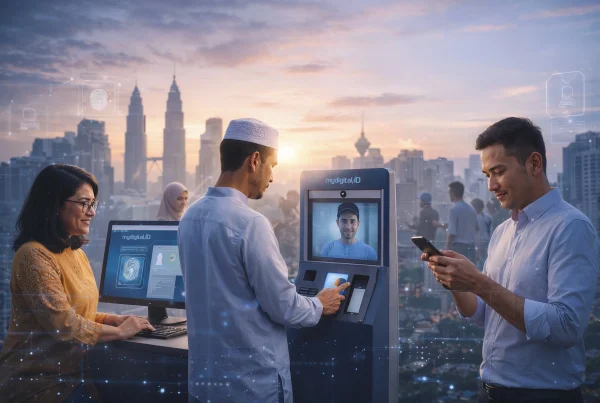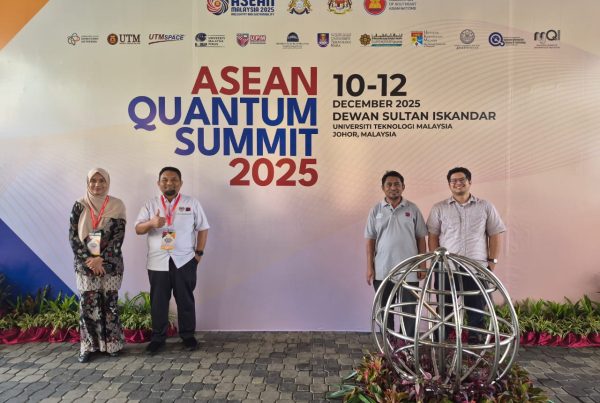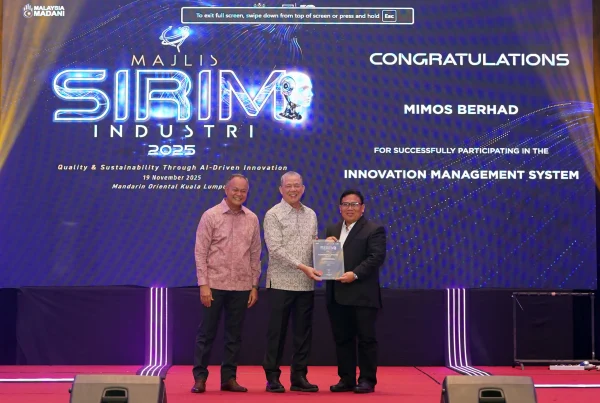By: Aisyah Nor Alias, Senior Analyst, Technology Diplomacy, Mimos Berhad.
Aminudin Khalid, Staff Engineer, Quantum Intelligence Centre, Mimos Berhad.
Muhammad Hafiz Laili, Head of Quantum Intelligence Centre, Mimos Berhad.
In the recently announced 13th Malaysia Plan (RMK13) is more than a policy document. It represents a strategic recalibration of the nation’s economic and technological trajectory in response to global disruption, shifting geopolitical landscapes, and the rapid acceleration of innovation.
As the national applied R&D centre, MIMOS welcomes RMK13’s strong emphasis on deep technologies, AI, and the full research-to-commercialisation pipeline. The Plan sets the tone for Malaysia’s ambition to become a digitally sovereign nation and a competitive player in the global high-tech arena.

1. From Policy to Purpose: RMK13 as a Framework for Technological Sovereignty
With over 600 strategic initiatives and 120 supporting policies, RMK13 outlines a comprehensive roadmap structured around four main pillars and nine focus areas. Several themes align strongly with MIMOS’ mission and national innovation priorities.
- High-Growth High-Value (HGHV) Industries
Strategic sectors such as semiconductors, clean energy, rare earth elements (REE), quantum technologies, and aerospace have been identified as national priorities. These sectors will help position Malaysia within global deep-tech value chains. - Strengthening the R&D&C&I Ecosystem
RMK13 recognises the need to treat Research, Development, Commercialisation and Innovation (R&D&C&I) as a continuous, integrated cycle. This is key to ensuring sustained technological progress and long-term economic resilience. - National Ambition for 2030
Malaysia aims to rank among the world’s top 12 countries in global competitiveness and among the top 30 in GDP size. This reflects the urgency of executing high-impact initiatives across strategic sectors.
2. Quantum & AI: Strategic Engines for Sovereignty
RMK13 places significant focus on Artificial Intelligence (AI), outlining national frameworks for digital infrastructure, governance, and widespread adoption. While AI takes centre stage, quantum technology, though less visible, remains a foundational enabler of national security and future digital systems.
Strategic applications of quantum technologies include:
- Post-quantum encryption and quantum-safe communications
- Quantum sensing for space and defence applications
- Quantum-powered edge computing to support next-generation AI systems
These capabilities are critical in the era of rising cyber threats, evolving digital alliances, and heightened data security needs. As Malaysia strengthens its digital sovereignty, early investment and ecosystem development in quantum technologies are imperative.
3. R&D&C&I: Advancing National Innovation Diplomacy
MIMOS recognises the centrality of RMK13’s call to elevate the entire R&D&C&I value chain. The Plan’s focus includes:
- Funding models that support long-term, high-risk research
- Strengthening national intellectual property (IP) ownership
- Facilitating talent development and cross-sector technology transfer
Aligned with the FIRST framework (Fund, Infrastructure, Regulation, Skills, Technology), MIMOS is positioned to contribute to a robust and future-ready innovation ecosystem. This will empower Malaysian industries to become global technology leaders.
4. Navigating Global Trends through Technology Diplomacy
RMK13 acknowledges emerging global megatrends, including:
- Fragmentation of economic and technological blocs
- Escalating climate disruptions and energy insecurity
- Shifting global leadership in critical technologies
In this landscape, technology diplomacy becomes a strategic tool. It supports Malaysia’s efforts to secure high-value foreign direct investment (FDI), build international R&D alliances, and influence global standards in quantum, AI, space, and climate technologies.
Final Thoughts: From Vision to Velocity
RMK13 presents a clear vision for Malaysia’s transformation. However, execution is key. National agencies, including MIMOS, must lead with coordinated strategies, cross-sector collaboration, and bold action to turn this vision into national impact.
This is more than a government plan. It is a national mission. It demands commitment across ministries, agencies, academia, and industry to ensure that the future is not only made by Malaysia, but Made for Tomorrow.




